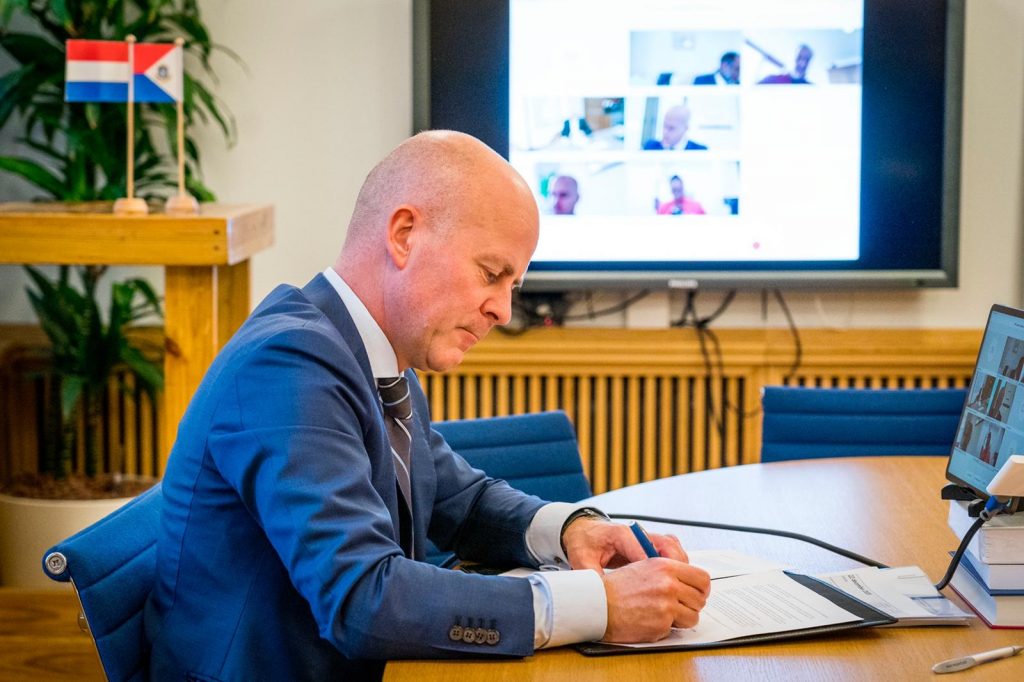Adjusted draft COHO law in September to Parliament

PHILIPSBURG — The prime ministers of St. Maarten, Curacao and Aruba have reached an agreement with the Netherlands about adjustments to the draft law COHO (Caribbean Reform and Development Entity). On September 3, the new draft is on the agenda of the Kingdom Council of Ministers. After its approval, the draft law will be submitted to the parliaments of the Netherlands, St. Maarten, Curacao and Aruba for debate and decision making. At that moment the draft law will become public.
Prime Minister Silveria Jacobs stated in press release issued by the Dutch Ministry of Home Affairs and Kingdom Relations (BZK) that her government is “delighted” with the “sorely needed changes” to the draft. “During the past four months there have been many discussions and cooperation to arrive at this point. St. Maarten is therefore looking forward to strengthening the relationship between all kingdom partners in the interest of our people.”
Aruba is also on board. Prime Minister Evelyn Wever-Croes: “This has been a difficult and instructive period. We sat fully committed at the negotiations table to create the best possible result for our people. Our institutions have been crucial in this process. There is now a draft law with which we as countries within the kingdom can show that mutual respect, cooperation and stability are the building blocks of our kingdom.”
Even Curacao’s Minister President Gilmar Pisas, previously thought to be dead against the COHO, was grateful for the result. “I am expressing my gratitude toward the official teams that have – based on the advices from the Council of State and the Councils of Advice – adjusted the draft law in such a way that it does justice to our autonomy and offers better financial and social perspectives for the people. For us, the people always come first. The adjusted draft will be once more reviewed by our Council of Advice and later our parliament will also discuss it. With the continuation of the reforms and the reversal of the shrinking economy, we expect that the effects will soon be visible for the population.”
While the three prime ministers are satisfied with the changes, St. Maarten’s parliamentarian Christophe Emmanuel remained critical as usual. While the press release about the agreement details the main changes, Emmanuel stated in a press release of his own that “nobody knows what these changes are.” The MP also criticized the government for not consulting with “the people and the parliament” even though all politicians will get the opportunity to have their say about the draft law once it is submitted to parliament come September.
Once the draft is submitted to parliament, parliamentarians will have all available information at their disposal. But Emmanuel maintains that it is “unconscionable to force the country to support and go along without factual information.”
The press release from the Ministry of BZK lists however four clear changes to the original draft law. They pertain to the authorities of the COHO, the role of the Ministry of BZK, financial supervision and loans and the appointment of board members.
The ownership of the countries for reform increases in the new draft. “The countries are responsible for drafting and establishing plans of approach. The authority of the COHO remains limited to supporting and supervising the reforms. The countries will also be involved in drafting policy rules for the COHO,” the press release states.
The Ministry of BZK will adopt a reticent approach towards its authority to give instructions to the COHO when there are indications that the implementation agenda exceeds the stipulations of the country package. The implementation agenda will be drafted by the COHO together with the countries.
In the new draft higher financial supervision has been replaced by a budget review that will be executed by the Board financial supervision (Cft). The Cft will review whether concrete activities of the implementation agenda are properly embedded in the budget. It will also check whether the budget contains elements that go against the country package. “The COHO does not supervise this; the financial supervisors do this through an extension of the already existing budget supervision.”
The countries furthermore reached consensus about the makeup and appointment of the COHO-board. Of the three members of the board, at least two, the chairman among them, will have “demonstrably affinity” with the Caribbean islands. There is also an agreement about the appointment process whereby the countries are part of the appointment-advice committee.























